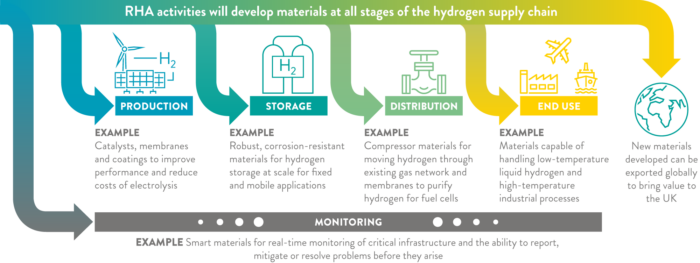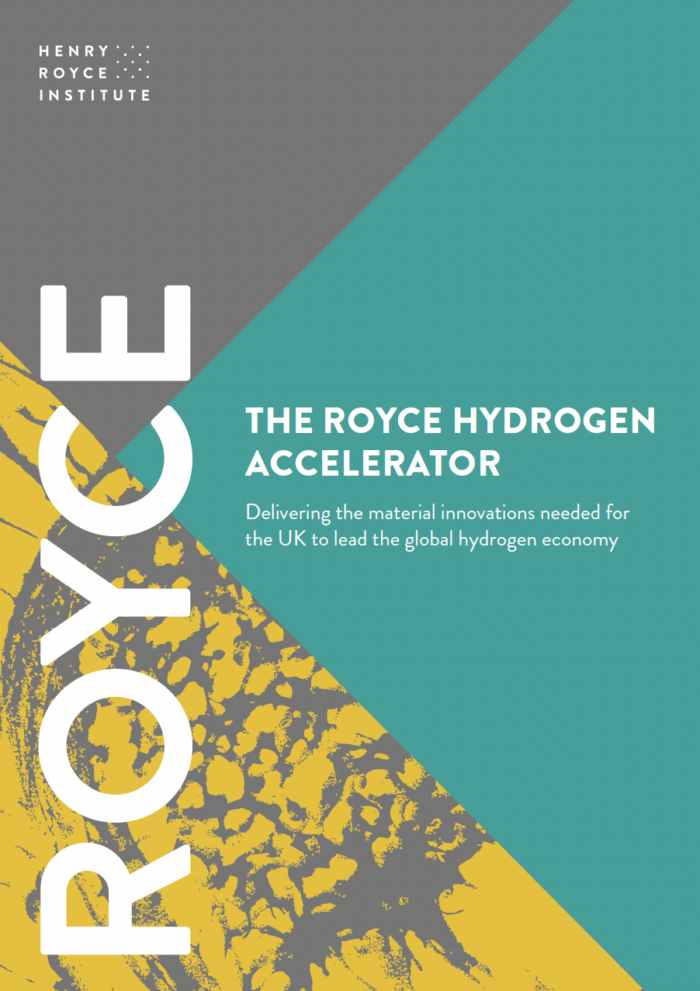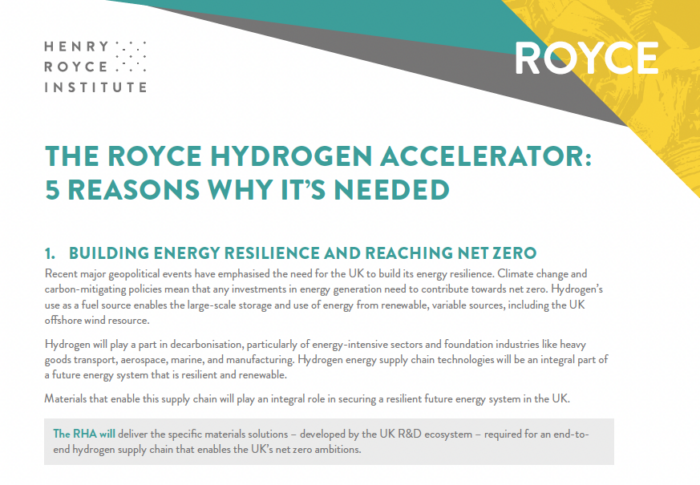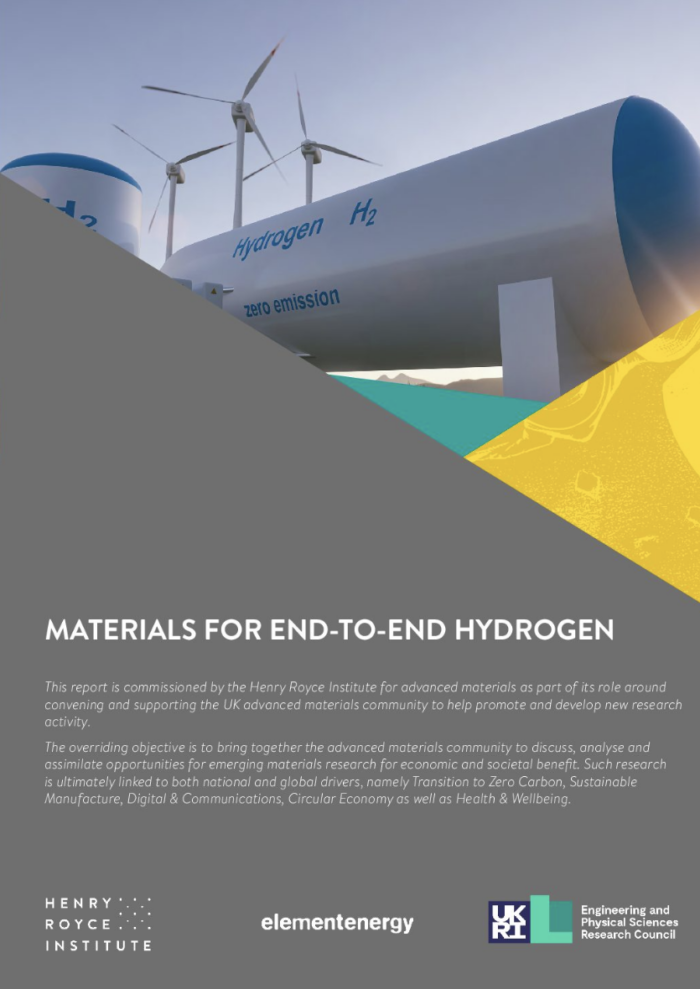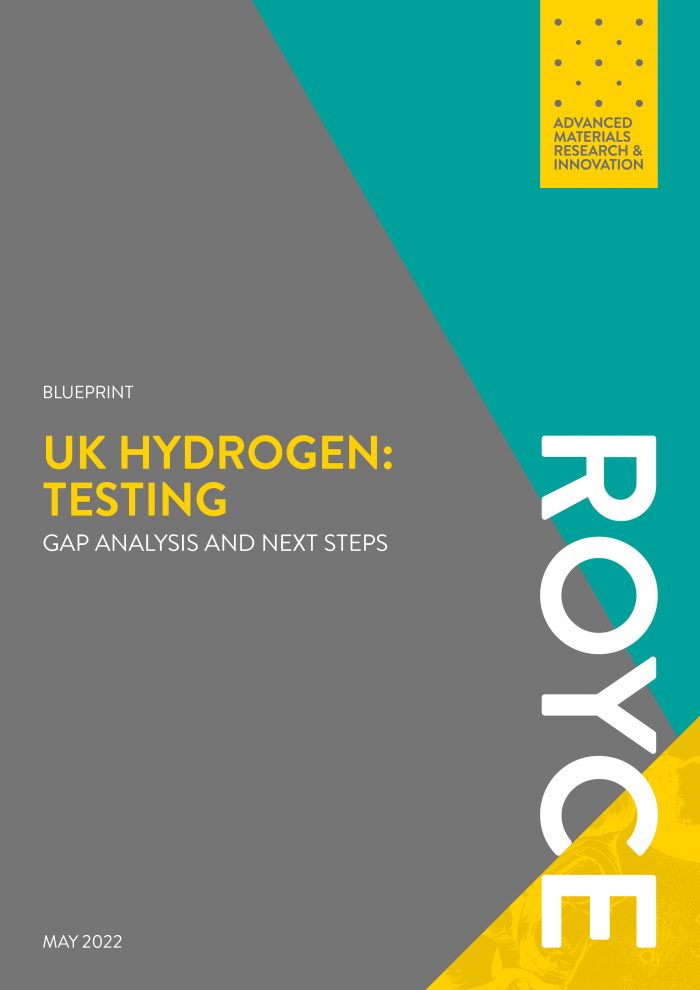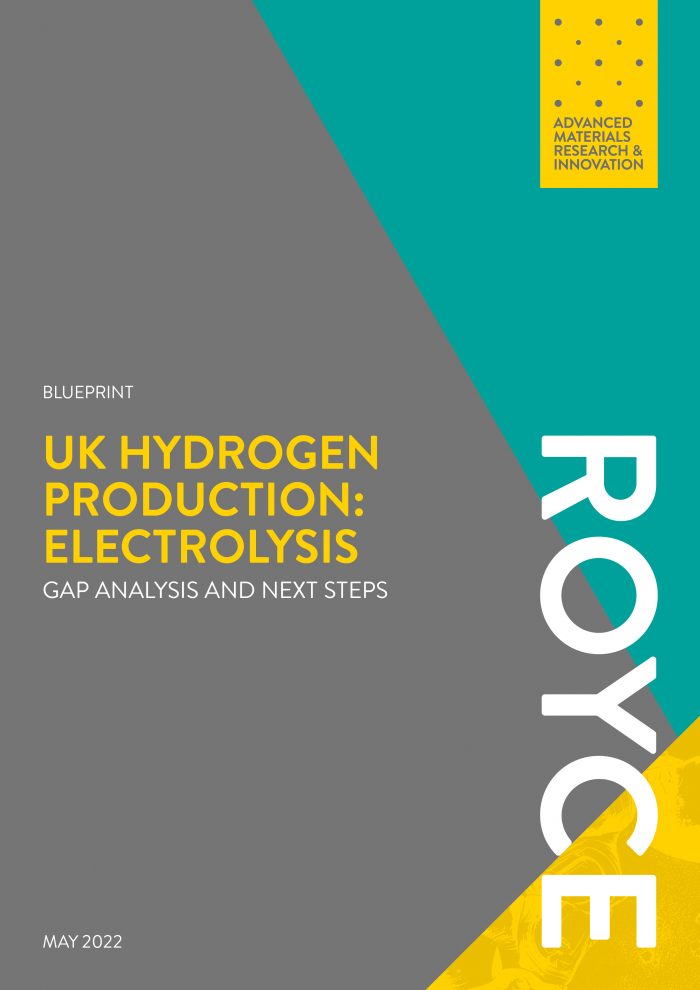This website uses cookies so that we can provide you with the best user experience possible. Cookie information is stored in your browser and performs functions such as recognising you when you return to our website and helping our team to understand which sections of the website you find most interesting and useful.

Royce Hydrogen Accelerator
Overview
The Royce Hydrogen Accelerator (RHA) has been designed to tackle materials challenges which are constraining the hydrogen supply chain. It will bridge the gap in the existing innovation landscape between lab-based materials research and proven technologies executed at scale. And it will coalesce a network of key voices from government, industry, academia and investment.
The accelerator will directly unlock £150-200m of funding by highlighting R&D opportunities in the hydrogen supply chain and presenting these as a compelling, de-risked prospectus to domestic and overseas investors.
The RHA will connect the UK’s already thriving business, research and innovation ecosystem for hydrogen materials with a broad, international investor base to provide access to funds and boost the potential for the UK to become an influential player in the global hydrogen market.
The RHA benefits from an experienced board with a deep understanding of advanced materials. Through close development work with industry and academia over the last two years, it has already prioritised the key materials challenges in the hydrogen supply chain.
Royce has already funded projects across the hydrogen supply chain with partners from throughout the sector, totalling £4 million in investment. This experience will contribute to the success of the Royce Hydrogen Accelerator in directing private funds toward opportunities that advance the UK’s hydrogen sector.
Background
Government is seeking to act now and capitalise on existing investments in hydrogen, build energy security, drive progress towards Net Zero targets, and attract over £1bn in future investment to the UK.
The Royce Hydrogen Accelerator will support this by delivering the material advances needed for the hydrogen supply chain.
Meeting the Hydrogen Materials Challenge
Hydrogen will play a major role in decarbonising energy-intensive industries worldwide – but the UK is falling behind. We need to develop materials-based solutions at an unprecedented rate to become a leader in hydrogen adoption.
We have unique structural advantages in this race, including world-leading R&D and the greatest wind energy potential in Europe. But we must act now to match the investments of other countries, maintain a globally competitive position, and keep economic benefits in the UK.
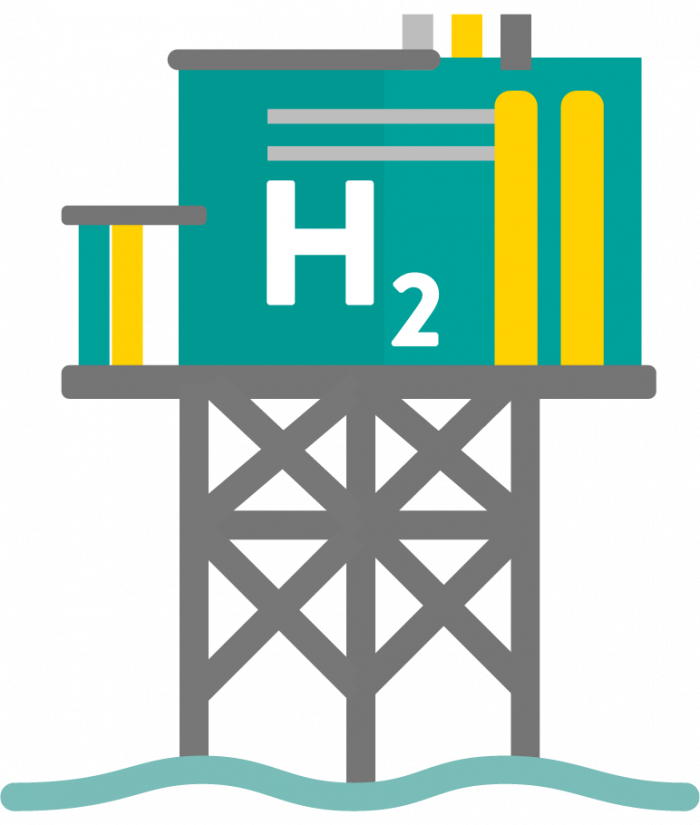
Why the RHA?
1 – BUILDING ENERGY RESILIENCE AND REACHING NET ZERO
Recent major geopolitical events have emphasised the need for the UK to build its energy resilience. Climate change and carbon-mitigating policies mean that any investments in energy generation need to contribute towards net zero. Hydrogen’s use as a fuel source enables the large-scale storage and use of energy from renewable, variable sources, including the UK offshore wind resource. Hydrogen will play a part in decarbonisation, particularly of energy-intensive sectors and foundation industries like heavy goods transport, aerospace, marine, and manufacturing.
Hydrogen energy supply chain technologies will be an integral part of a future energy system that is resilient and renewable. Materials that enable this supply chain will play an integral role in securing a resilient future energy system in the UK. The RHA will deliver the specific materials solutions – developed by the UK R&D ecosystem – required for an end-toend hydrogen supply chain that enables the UK’s net zero ambitions.
2 – ADVANCING THE MOST CRITICAL TECHNOLOGY AREAS
The limits of materials capabilities are creating barriers to growth across the hydrogen supply chain, from production and storage to distribution, use, and operational monitoring. The UK needs to scale its hydrogen capabilities, and Royce has worked with industry and academia to identify the major materials technology challenges that are preventing this. The RHA will guide the funding and focus of materials R&D activities in the UK to resolve these specific challenges.
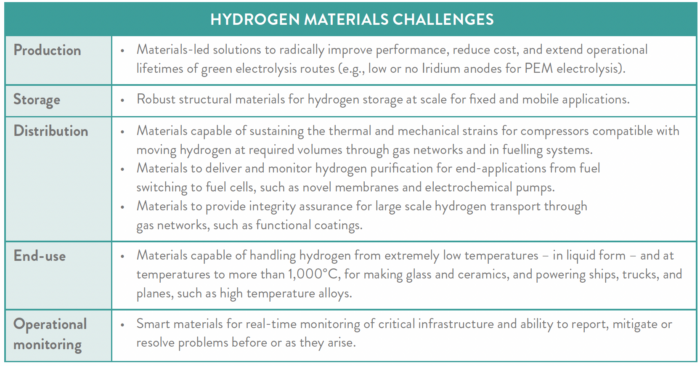
3 – COMPETING IN A GLOBAL MARKET
There is an urgent need for the UK to take action now to match the investments of other countries and maintain its globally competitive position. The pace of global progress on hydrogen technologies is increasing, and if we do not act now, the investment opportunity will disappear overseas. The US Inflation Reduction Act and the EU Green Deal Industrial Plan are just two high-profile examples of international incentives that pose direct threats to investment and growth in the UK.
The UK has unique strengths in its world-leading R&D capabilities (world class universities, robust IP legislation, and labour skills), extensive offshore wind energy sources, a distributed gas network, policy precedents, and its status as a leading financial hub.
These strengths prime the UK to become a key player in the adoption of hydrogen. Materials R&D provides the innovative solutions at critical points across the supply chain to realise hydrogen commercialisation at scale and pace. Growth of this supply chain will create more skills and R&D capabilities in the UK, helping to maintain its globally competitive position as a science and technology leader. The RHA will build the capabilities to jump-start hydrogen materials development with a clear focus on scaling these technologies to commercialisation in the UK.
4 – CAPTURING THE LIFETIME VALUE OF THIS R&D IN THE UK
Once the UK’s R&D ecosystem has created solutions to these real, high-value, transformational challenges, they must be translated into real economic value for this country. The UK already has companies of all sizes across the hydrogen supply chain, including Ceres Power, ITM Power, Johnson Matthey, INEOS, bp, National Gas and Rolls-Royce.
These companies benefit from otherwise curtailed offshore wind energy, which hydrogen offers the option to utilise by providing a large-scale energy storage option. The UK can build on this vibrant community to create a high-value supply chain, centred on these new materials technologies.
The accelerator will connect the R&D landscape with the UK’s supply chain, demonstrators, end-users and financial institutions from the very start. The RHA’s operation will be designed to safeguard R&D and commercialisation outputs for the UK. The RHA will, by embedding stakeholder connections and structuring investment conditions, ensure that value accrues to the UK.
5 – LEVERAGING INVESTMENTS TO UNLOCK A HYDROGEN INDUSTRY
The RHA board will grow to be an eclectic mix of sector leaders in industry, academia, and government. This support will build confidence in investment. The board knows that institutional, private equity and sovereign wealth funds are increasingly looking to invest in emerging technologies that will enable critical applications in future energy systems.
These investments have the potential for high returns, and will also create a ripple effect of increasingly significant investment opportunities as they enable a full hydrogen supply chain that is exploitable in the UK and exportable globally. In 2050, the total addressable market for green hydrogen will be worth over US$1 trillion globally (Goldman Sachs), €120 billion in Europe (Aurora), and £13 billion in the UK (BEIS). The RHA has identified in excess of £150 million worth of investment opportunities for hydrogen materials in the UK, including:
- £50 million in materials discovery.
- £100 million in accelerating novel materials into end-use applications.
- £25 million in research challenges for large-scale storage and distribution infrastructure. The RHA will create specific, compelling and de-risked investment propositions through the engagement of the critical hydrogen economy decision-makers: industry, academia, investors, and government
The RHA will create specific, compelling and de-risked investment propositions through the engagement of the critical hydrogen economy decision-makers: industry, academia, investors, and government.
Associated Reports
Materials for End-to-End Hydrogen
Wide-scale hydrogen deployment demands materials compatible with its production, storage, and distribution; with this in mind Royce commissioned a Materials for end-to-end Hydrogen landscape report to explore the next steps required in the development of advanced materials for a new hydrogen economy.
The landscaping programme set out to identify the most valuable materials research areas to accelerate this energy transition and took on board many different perspectives from across over one hundred companies and universities.
Royce UK Hydrogen Testing Blueprint
The Royce Hydrogen Testing Blueprint provides, for the first time, a comprehensive view of the UK’s testing capabilities and is designed to inform future spending plans in this area. It sets out how the UK’s hydrogen testing needs can be broadly divided into a series of temperature and pressure domains aligned to industry and academic needs in each area.
The Blueprint demonstrates that while the UK has core capabilities in hydrogen testing, we also need to invest further to strengthen the testing base to provide resilience and develop the future talent pool.
Royce UK Electrolysis Needs Blueprint
This Royce UK Electrolysis Blueprint provides a comprehensive view of the UK’s electrolysis capabilities and, once again, is designed to inform future spending plans in this area. It sets out how the UK’s electrolysis needs for hydrogen can be broadly divided into a series of scale up, electrolysis type and monitoring domains, again with the aligned industry and academic needs identified for each.
Once again, while it is clear that the UK has core capabilities in electrolysis, this analysis highlighted areas in which we need to invest further to strengthen the base, to again provide resilience and develop a skills pipeline.
Click here to view the UK Hydrogen Production: Electrolysis Blueprint
